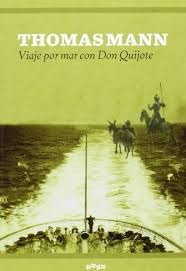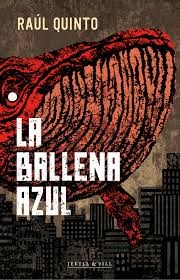
Original language: German
Original title: Sea trip with Don Quixote
Translation: Genoveva Dieterich
Year of publication: 1945 (written in 1934)
Valuation: High recommendable
One could reflect on the weight that the author’s talent can have in a book, I mean, to what extent a dexterous hand is capable of lifting any text, no matter what it is about. It is not just the prose, the style or the elegance, it is the cadence, the wisdom to tell things with the exact tone, to make the book interesting and to have it controlled, balanced and at the point that the text requires. This is done with technique, with work, of course, but it still seems to me that the raw material is irreplaceable, and it is what makes the book exude naturalness and seem effortlessly written. With all this I can no longer hide that I love Thomas Mann, especially the one from Death in Venice although from time to time he gets carried away by the excessively curly phrase or the digressions sometimes get out of hand.
Those qualities that I pointed out, I would dare to say, can be seen especially in minor works, when the writer is not planning to create something important and seems to let the text flow as mere entertainment. Sea voyage with Don Quixote It is a kind of small diary, a few days long, written on one of the several sea voyages that Mann made with his wife Katia between Europe and New York. We could think of something similar to the cruise that David Foster Wallace told in that corrosive little book, but the similarities are reduced to the presence on a ship sailing the immensity of the sea (how can you write two such different, and equally accurate, things from the same reason).
Thomas Mann does not propose anything concrete by recounting his oceanic experience. He limits himself to telling small anecdotes, describing in passing the atmosphere of the rooms or the deck, or quick notes about the changing weather. The rest are reflections that are chained together without more planning than what arises spontaneously on the blank paper, and where an important role remains for your bedside reading, which is naturally the Don Quixote that appears in the title.
Nor is it an essay about Cervantes’ book, but rather comments that emerge as you read. Mann admires not only the personality of Don Quixote, but also how he evolves, how the author treats his character, he extends something more to the lively defense that Cervantes makes of his work against the imposture of Avellaneda’s book, or the weight of the original character compared to the funny crazy caricature that we all, to some extent, have internalized. The German author’s opinions are of such finesse and depth that one is aware that he has completely connected with the classic. All of this, expressed in small pills and in no apparent order, leads to the feeling that one is on board with Mann himself, sharing a coffee with him and exchanging impressions about Don Quixote or, rather, listening raptly to his reflections.
Not everything comes down to Cervantes. The small diary includes comments, always relaxed and elegant, about the journey itself, sensations about the overwhelming smallness in front of the immense ocean, the distortion of perspective due to isolation and remoteness, or curiosities such as the daily call to a progressive change of time. and the mistake of living the same time slot twice. The story sometimes extends into apparently banal matters, such as the deliberately friendly content of the information that is circulated on the ship (the cruise ship as a world independent of external reality), and at other times it delves into deep reflections that without problem some could be applied to our 21st century, as when he points out “Ah, humanity! Their spiritual-moral progress remains behind their technical progress, they are far behind.”
But not even in those moments does the author touch on particularly sensitive issues, which is striking in the complicated context of the 1930s. It would seem that Mann avoids thorny issues that he will touch on in other works, now he is like someone, like those information sheets of the cruise, feeling in a hostile environment, tries to focus on friendly or at least harmless matters. In this way, the book transmits at the same time sharpness and relaxation, and allows you to enjoy an author who, in whatever format, always seems capable of writing well.
Other works by Thomas Mann reviewed in ULAD: Death in Venice, The Magic Mountain
Source: https://unlibroaldia.blogspot.com/2025/01/thomas-mann-viaje-por-mar-con-don.html


